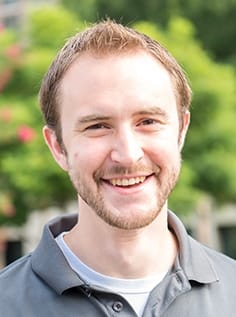
“Growing up they used to call me ‘Zach the Lego maniac,’ which I guess was from a commercial in the ’80s,” said Zachary Underwood (Engineering: Mechanical ’13). In Dearborn, Michigan, Zach grew up with a reputation for taking things apart, figuring out how they worked, and making them into something new.
Being homeschooled allowed Zach to learn mechanics from his father, who enjoyed fixing up old cars. “My dad would never pay for a mechanic because it was so expensive. It was always, ‘Zach, come help me with the tires’ or ‘the transmission’ or ‘the suspension.’”
After Zach finished high school, he came to Pensacola Christian College to study engineering with a mechanical concentration. “In engineering, you joke a lot,” he said. “If you’re an electrical engineer, everyone thinks that you can fix their light or their battery or something. If you’re a mechanical engineer, they think you can fix the car or something. That’s not necessarily true.”
Between his junior and senior years, Zach interned at Ford Motor Company. While there, he worked on developing a charge port light ring for electric cars. Three years later, he would apply for and receive a patent for a small door, similar to a fuel door, and the charge port light ring. The light ring displayed the charge level on both the inside and outside of the door.
“It’s similar to an iPhone—you have a rectangle battery [Icon] that fills up to show how full it is. With this charge port light ring, [if] half the ring [is] lit up, your car is halfway charged,” he explained. “Other manufacturers will use different colored lights—blue means you’re half charged and yellow means you’re a quarter of the way—but you have to remember that.”
When he started college, Zach Underwood didn’t have a specific direction for his mechanical engineering degree. “I knew what I liked to do. I didn’t have a dream job,” Zach said. “I don’t know what I would’ve done. Mr. Manciagli [engineering faculty at PCC] was giving us ideas such as oil drilling or weapons manufacturing or that kind of thing.”
Before his internship ended at Ford, the company asked Zach to apply for a job. “I knew after graduation where I was going,” he said. “Engineering school teaches you how to learn and how to think. It exposes you to tools. On the job every day, I’m not using calculus, but I understand the math I’ve been exposed to,” he said. “I don’t think you can go straight from high school into [an engineering] job. You’ve got to be exposed to problem-solving skills.”
As soon as he began at Ford in 2013, Zach went into the Ford graduate program which brings an employee through five different jobs for five to six months each, allowing him to understand each part of the company. After three years of traversing the inner workings of the Ford Motor Company, Zach began his work in hybrid battery validation. In the lab, Zach is given prototypes of vehicle batteries that have been thoroughly developed and tests them for durability, longevity, and overall safety—taking things apart, figuring out how they worked, and making them into something better.
The same things he enjoyed doing as a child have become Zach Underwood’s daily responsibilities at one of America’s most well-known automakers. He didn’t plan where he would work, but how he would work, and that was enough to set God’s plan into motion for his life. “I wish I had understood it’s okay if you don’t know for sure what you want to be or do,” said Zach. “Even though we may not know our own minds and hearts, God has a way of putting things in our paths to get us where we need to be.”
Read more about how God is directing and working through PCC faculty and alumni.
